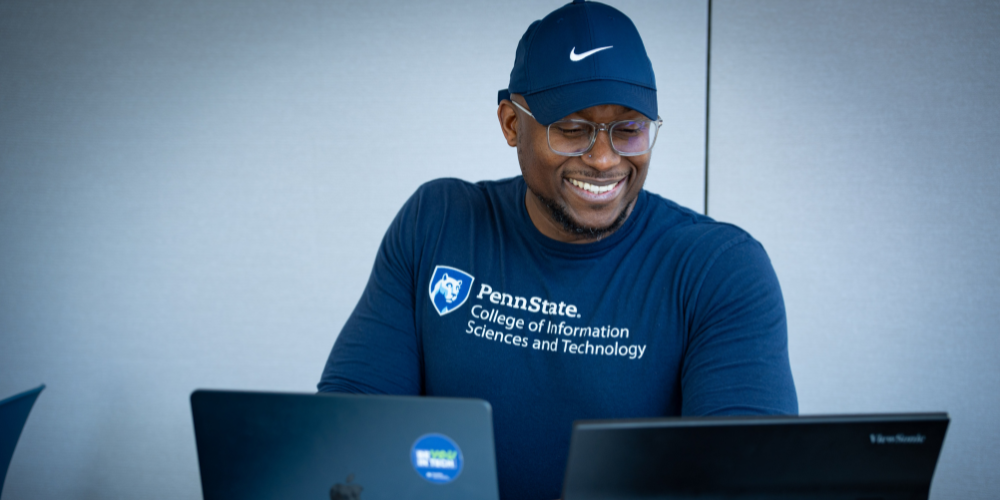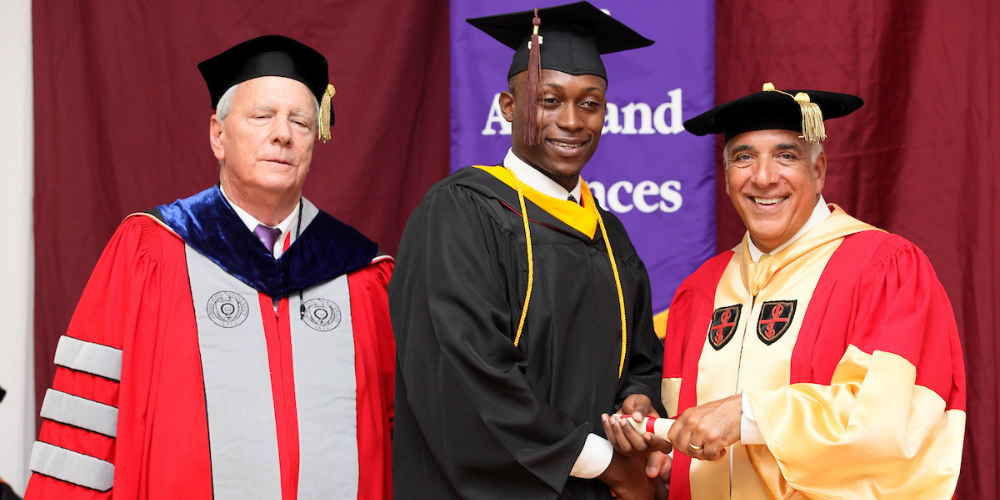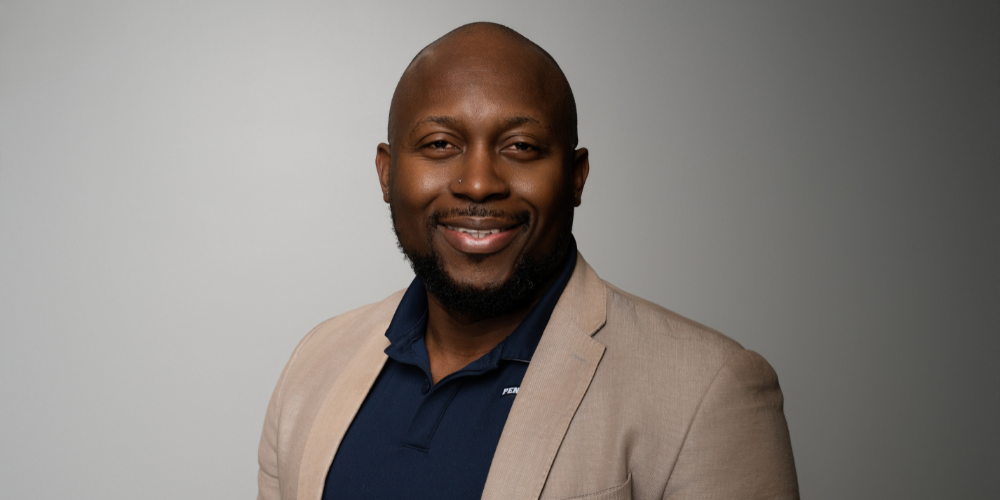For Jason Lucas, MPH ’20, BSc ’10, every milestone in his academic journey, from St. George’s University to Penn State University, has been guided by determination, mentorship, and an unwavering belief that excellence has no borders.
A proud Grenadian from La Borie, St. George’s, Lucas has carried his roots with him through every stage of his career. Now a PhD candidate in informatics at Penn State and a National Science Foundation LinDiv Fellow, he is leading research that uses artificial intelligence (AI) to make technology more inclusive and ethical across languages and cultures.
His path, which began in the classrooms of SGU, has taken him to the cutting edge of AI innovation—yet his purpose remains deeply rooted in service and community.

Advancing AI for global good
Lucas’ academic journey has been anything but traditional. After earning degrees in information technology, health informatics, and public health, he discovered the perfect intersection of those fields through AI. Today, his research is helping shape how AI understands language, culture, and humanity itself.
“People questioned why I was pursuing so many degrees,” Lucas said. “But I knew I was building something unique, an interdisciplinary foundation that would eventually position me to work at the intersection of AI, cybersecurity, public health, and linguistic diversity.”
Since 2021, he has served as a graduate research assistant at Penn State’s Information, Knowledge, and wEb (PIKE) research lab, one of the leading groups in data mining and AI safety. There, he develops multilingual natural language processing tools that detect and counter harmful online content across more than 70 languages.
“I wake up every day knowing my research can make a difference. AI systems rarely include Afro-Caribbean perspectives or languages like Grenadian or Haitian Creole, or Jamaican Patois. My goal is to change that.” —Jason Lucas, MPH ’20, BSc ’10
His work, published in premier AI conferences such as the Empirical Methods in Natural Language Processing (EMNLP), the Association for Computational Linguistics (ACL), and the North American Chapter of the Association for Computational Linguistics (NAACL), has earned more than 200 citations; and focuses on ensuring that AI systems represent diverse voices, including those from the Afro-Caribbean community.
Lucas has also collaborated with scientists at the Lawrence Livermore National Laboratory, known as “the smartest square mile on Earth” due to its significant scientific and engineering contributions to national security, energy, and fundamental science. His partnerships there, and with innovators at Interactions LLC, bring his findings to life, applying ethical AI to real-world challenges in security and communication.
“Every project I take on is about making technology work for people, especially those who have historically been left out of the conversation,” he said. “That’s what excites me most: knowing my work can help bridge the digital language divide.”
A lifelong connection to SGU
Before he was pushing the boundaries of AI, Lucas was shaping minds and driving innovation in the classrooms of SGU. His connection to the University spans nearly two decades—first earning his Bachelor of Science in information technology in 2010, then returning a decade later to complete a Master of Public Health in epidemiology.
“SGU wasn’t just where I studied; it became where I taught, mentored, and grew as both an educator and innovator. It taught me that my Grenadian identity wasn’t a limitation but a unique lens through which to view global problems.” —Jason Lucas, MPH ’20, BSc ’10
As a faculty member in SGU’s School of Medicine, Lucas led the B-Line division in the Department of Clinical Skills, managing the University’s premier platform for simulation-based medical education. When the COVID-19 pandemic brought the world to a standstill, he led the team that created SGU’s first fully virtual clinical evaluation exercise—allowing thousands of students to continue their education remotely.
“That period tested every skill I had,” Lucas recalled. “It taught me what leadership under pressure truly means. It was about solving problems no one had solved before, in real time.”
That spirit of innovation, first nurtured at SGU, now guides his work in AI, proving that the lessons of adaptability and compassion learned in one field can transform another.
Turning Challenges into Strengths
Lucas’ success is also a story of resilience. Living with ADHD and dyslexia, he had to reimagine what learning looked like for him. Instead of viewing these as obstacles, he transformed them into sources of strength, using tools like Speechify and AI writing assistants to excel in his studies and research.
These experiences now inform his commitment to building technology that supports people with diverse learning needs. “Technology helped me not just cope, but thrive,” he said. “That’s why I’m passionate about creating AI systems that are inclusive and beneficial for everyone, no matter their background or abilities.”
“My challenges gave me empathy,” added Lucas. “They shaped the way I design and think about technology, with accessibility and inclusion at the center.”

Mentorship and paying it forward
Throughout his academic journey, Lucas has been guided by mentors who recognized his potential and encouraged his interdisciplinary approach. Among them, Dr. Theodore Hollis, SGU professor emeritus and former dean of the School of Arts and Sciences, played a pivotal role in Lucas’ transition to Penn State and his development as a researcher.
“Dr. Hollis didn’t just influence my PhD journey—he helped me see what was possible,” Lucas said. “He showed me that true mentorship isn’t transactional; it’s transformational.”
Today, Lucas carries that philosophy forward. He mentors five students, from undergraduates to early PhD candidates, helping them build confidence, overcome research challenges, and grow into independent thinkers. “The best way to repay excellent mentorship is to provide it to others,” he said. “Every student I mentor, every door I open for someone from an underrepresented background—that’s Dr. Hollis’s legacy living on through me.”
Building the future of ethical AI
Looking ahead, Lucas envisions a career that blends academic leadership, research innovation, and service to the Caribbean. He hopes to establish research initiatives dedicated to advancing ethical AI for social good and protecting vulnerable populations from online misinformation.
That same sense of purpose guides his vision for giving back to Grenada. Lucas hopes to bring advanced research opportunities to the region by partnering with universities, hosting conferences, and creating pipelines for young Grenadians to work on global technology projects without leaving home.
“My research is about protecting people and communities, including those in the Caribbean, from the harmful side of technology—things like online misinformation and manipulation,” Lucas said. “I want to make sure the benefits of AI are accessible to everyone, not just those in wealthier or more technologically advanced nations.”
At the heart of Lucas’ drive is his family. His mother, Jacqueline Lucas, remains his greatest inspiration, while his sister, Aklemia, continues to be his motivation, embodying, as he describes, “the spirit of a lion and the determination of a warrior.” Her resilience, he says, pushes him to be better every day and reminds him why representation and equity matter in every system he builds.
In honor of his sister’s strength, he also hopes to launch a nonprofit to support Caribbean students with learning disabilities, continuing his family’s legacy of empowerment and service.


